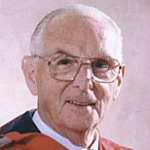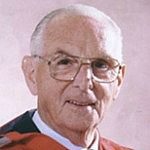
Quotes by Oswald Sanders
Courage is that quality of mind which enables people to encounter danger or difficulty firmly, without fear or discouragement.
True greatness, true leadership, is achieved not by reducing men to one’s service but in giving oneself in selfless service to them.
Good effective spiritual leaders infuse others with an animating, quickening and exalting spirit of enthusiasm for the person of Christ, growth in Christ and the mission of the church.
If a man is known by the company he keeps, so also his character is reflected in the books he reads. A leader’s reading is the outward expression of his inner hungers and aspirations.
Failing to delegate, the leader is caught in a morass of secondary detail; it overburdens him and diverts his attention from primary tasks. People under him do not achieve their own potential. In some cases, insisting on doing a job oneself is a result of simple conceit.
A leader will seldom say, “I don’t have the time.” Such an excuse is usually the refuge of a small-minded and inefficient person. Each of us has the time to do the whole will of God for our lives.
Most Bible characters met with failure and survived. Even when the failure was immense, those who found leadership again refused to lie in the dust and bemoan their tragedy. In fact, their failure and repentance led to a greater conception of God’s grace. They came to know the God of the second, chance, and sometimes the third and fourth.
Concerning relationships, tact is the ability to deal with people sensitively, to avoid giving offense, to have a feel for the proper words or responses to a delicate situation.
Lest we be “terrified by our adversaries,” it is well to remember that Satan’s power is not inherent but permitted (Rom. 13:1). It is not unlimited, but controlled (Job 1:12; 2:6). It is not invincible, but broken (Luke 11:21-22). It is not assured of success, but is surely doomed (Rev. 20:2-3). Satan knows well that there is no ultimate victory for him. The pronounced sentence has only been postponed. But he works to hinder and postpone Christ’s final triumph. We can rejoice in the certainty of John’s assurance: “Greater is he that is in you, than he that is in the world” (1 John 4:4).
Worship is the loving ascription of praise to God for what He is in Himself and in his providential dealings. It is the bowing of our innermost spirit before him in deepest humility and reverence. Worship is the adoring contemplation of God as he has been pleased to reveal himself in his son and in the Scriptures.
Faith does not require external confirmation but believes God in spite of appearances.
As in the parable of the pounds (minas in the NIV; Luke 19:12-27), where each servant was given the same amount of money, we each have been given the same amount of time. But few of us use it so wisely as to produce a tenfold return. The parable recognizes different abilities; the servant with less capacity but equal faithfulness received the same reward. We are not responsible for our endowments or natural abilities but we are responsible for the strategic use of time.
If knowledge is the accumulation of facts, intelligence the development of reason, wisdom is heavenly discernment. It is insight into the heart of things. Wisdom involves knowing God and the subtleties of the human heart. More than knowledge, it is the right application of knowledge in moral and spiritual matters, in handling dilemmas, in negotiating complex relationships.
If knowledge comes by study, wisdom comes by Holy Spirit filling.
Not every man can carry a full cup. Sudden elevation frequently leads to pride and a fall. The most exacting test of all is to survive prosperity.
When…people learn to rely not on their own power and wisdom, but to depend on God, there is no limit to their usefulness in God’s service.
The effective fervent prayer of a righteous man can accomplish much. But Scripture (Ac. 2:1-2; 4:24, 31; 12:5; 13:1-4) and experience combine to teach that the united prayers of many righteous accomplish still more.
Mastering the art of prayer, like any other art, will take time, and the amount of time we allocate to it will be the true measure of our conception of its importance.
Leadership training cannot be done on a mass scale. It requires patient, careful instruction and prayerful, personal guidance over a considerable time. Disciples are not manufactured wholesale. They are produced only one by one, because someone has taken the pains to disciple, to instruct and enlighten, to nurture and train one that is younger.
Approaching a disciplinary situation, the leader must remember five guidelines:
1. First conduct a thorough and impartial inquiry.
2. Then consider the overall benefit to the work and to the individual.
3. Do all in the spirit of love and in the most considerate manner.
4. Always keep the spiritual restoration of the offender in view.
5. Pray it through.
Spiritual Leadership, Moody Publishers, 1967, p. 126. Get this book!
Because we children of Adam want to become great, He became small. Because we will not stoop, He humbled Himself. Because we want to rule, He came to serve.
The disciples made no move to appoint a replacement for Jesus, tacit evidence that they were conscience of His abiding presence, their living leader and Lord.
Spiritual Leadership, Moody Publishers, 1967, p. 146. Get this book!
Most Bible characters met with failure and survived. Even when the failure was immense, those who [rebounded] refused to lie in the dust and bemoan their tragedy. In fact, their failure and repentance led to a greater conception of God’s grace. They came to know the God of the second, chance, and sometimes the third and fourth.
Spiritual Leadership, Moody Publishers, 1967, p. 134. Get this book!
We naively think that the more we grow as Christians, the easier it will be to discern the will of God. But the opposite is often the case. God treats the mature [Christian] as a mature adult, leaving more and more to his or her spiritual discernment and giving fewer bits of tangible guidance than in earlier years.
Spiritual Leadership, Moody Publishers, 1967, p. 121. Get this book!
Both our Lord and His bondslave Paul made clear that true prayer is not dreamy reverie. “All vital praying makes a drain on a man’s vitality. True intercession is a sacrifice, a bleeding sacrifice,” wrote J.H. Jowett. Jesus performed miracles without a sign of outward strain, but “He offered up prayers and petitions with loud cries and tears” (Hebrews 5:7).
Spiritual Leadership, Moody Publishers, 1967, p. 87. Get this book!
No man, however gifted and devoted, is indispensable to the work of the kingdom.
Spiritual Leadership, Moody Publishers, 1967, p. 144. Get this book!
Leaders who want to show sensitivity should listen often and long, and talk short and seldom. Many so-called leaders are too busy to listen. True leaders know that time spent listening is well invested.
Spiritual Leadership, Moody Publishers, 1967, p. 75. Get this book!
True greatness, true leadership, is found in giving yourself in service to others, not in coaxing or inducing others to serve you.
Dwight L. Moody once said that he would rather put a thousand men to work than do the work of a thousand men.
Spiritual Leadership, Moody Publishers, 1967, p. 137. Get this book!
One facet of leadership is the ability to recognize the special abilities and limitations of others, combined with the capacity to fit each one into the job where he or she will do best. To succeed in getting things done through others is the highest type of leadership.
Spiritual Leadership, Moody Publishers, 1967, p. 137. Get this book!
Procrastination, the thief of time, is one of the devil’s most potent weapons for defrauding us of eternal heritage. The habit of “putting off” is fatal to spiritual leadership. Its power resides in our natural reluctance to come to grips with important decisions. Making decisions, and acting on them, always requires moral energy. But the passing of time never makes action easier; quite the opposite. Most decisions are more difficult a day later, and you may also lose an advantage by such delay. The nettle will never be easier to grasp than now.
Spiritual Leadership, Moody Publishers, 1967, p. 98. Get this book!
If a Christian is not willing to rise early and work late, to expend greater effort in diligent study and faithful work, that person will not change a generation. Fatigue is the price of leadership.
Spiritual Leadership, Moody Publishers, 1967, p. 119. Get this book!
If leaders are to survive, they must view the difficult as common-place, the complex as normal.
Spiritual Leadership, Moody Publishers, 1967, p. 132. Get this book!
Indeed, if we read merely to stock our heads with ideas, to feel superior to others, or to appear learned, then our reading is useless and vain.
Spiritual Leadership, Moody Publishers, 1967, p. 103. Get this book!
Our sense of humor is a gift from God which should be controlled as well as cultivated.
Spiritual Leadership, Moody Publishers, 1967, p. 67. Get this book!
So strong was Jesus’ zeal that His friends thought He had abandoned common sense (Mark 3:21) and His enemies charged Him with having a demon (John 7:20).
Spiritual Leadership, Moody Publishers, 1967, p. 110. Get this book!
Leaders take lessons from the past, but never sacrifice the future for the sake of mere continuity. People of vision gauge decisions on the future; the story of the past cannot be rewritten.
Spiritual Leadership, Moody Publishers, 1967, p. 57. Get this book!
Time lost can never be retrieved. Time cannot be hoarded, only spent well.
Spiritual Leadership, Moody Publishers, 1967, p. 94. Get this book!
[Righteous] anger is not selfish and does not center on the pain you currently feel. To be free of sin such anger must be zealous for truth and purity, with the glory of God its chief objective.
Spiritual Leadership, Moody Publishers, 1967, p. 70. Get this book!
It is impossible for a believer, no matter what his experience, to keep right with God if he will not take the trouble to spend time with God. Spend plenty of time with him; let other things go, but don’t neglect Him.
The Bible is very clear on the reasons why prayers go unanswered, and every reason centers on the believer’s relationship with God. God will not cooperate with prayers of mere self-interest, or prayers that come from impure motives. The Christian who clings to sin closes the ear of God. Least of all will God tolerate unbelief, the chief of sins.
Spiritual Leadership, Moody Publishers, 1967, p. 91-92. Get this book!
The leader must use God’s power to move human hearts in the direction he believes to be the will of God. Through prayer the leader has the key to that complicated lock… In prayer we deal directly with God and only in a secondary sense other people. The goal of prayer is the ear of God. Prayer moves others through God’s influence on them. It is not the prayer that moves people, but the God to whom we pray.
The best use of one’s life is to spend it for something that will outlast it.
Spiritual Leadership, Moody Publishers, 1967, p. 93. Get this book!
[Discipleship] training cannot be done on a mass scale. It requires patient, careful instruction and prayerful, personal guidance over a considerable time. Disciples are not manufactured wholesale. They are produced only one by one, because someone has taken the pains to disciple, to instruct and enlighten, to nurture and train one that is younger.
Spiritual Leadership, Moody Publishers, 1967, p. 150. Get this book!


